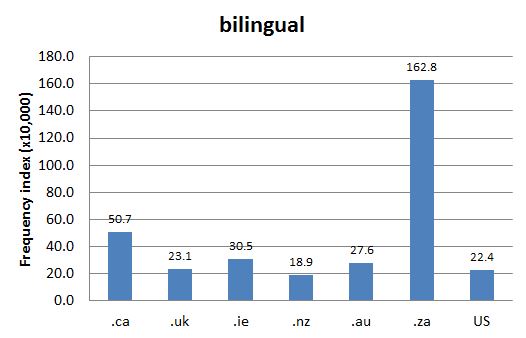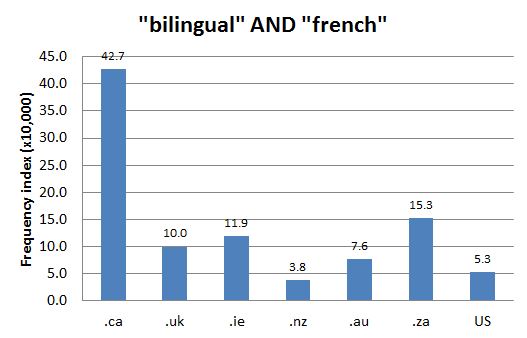DCHP-2
bilingual bi-lingual DCHP-2 (June 2016)
1 adj.
speaking both English and French with (near-)native fluency.
Type: 4. Culturally Significant — While the general definition of bilingual is 'being able to speak or write fluently in two languages', in Canada, it is generally implies that the languages are English and French (see Canadian Encyclopedia reference). As Chart 1 shows, bilingual, without any limiters, is most frequent in Canada in the North American context, lagging (though considerably) only South Africa (.za), which has eleven official languages and thus more need to express the concept. Chart 2 shows that when used in relation to French, bilingual is most frequently documented in Canada.
See also Gage-1, s.v. "bilingual" (3), which is marked "Cdn.", ITP Nelson, s.v. "bilingual" (2 & 3), which is marked "Canadian".See also: bilingualize bilingualism
2 adj.
pertaining to the official use of both English and French.
Type: 4. Culturally Significant — The legal precedent for using either English or French in Canada dates to Section 133 of the British North America Act of 1867, in which the use of either language was officially permitted in Parliament and before the federal courts (see the 1867 quotation, which does not yet use the term bilingual). The Act made mandatory the keeping of records in both English and French in Parliament as well as all governmental journals, enactments and publications of laws (see Canadian Heritage reference).
However, French was never quite equal to English. Some persisting challenges were later addressed by The Royal Commission on Bilingualism and Biculturalism established in 1963 (see also bi and bi), whose recommendations led to federal and provincial language policy changes as outlined in the Official Languages Act of 1969. The Act declares English and French the official languages of Canada and mandates all federal institutions to provide services in either English or French upon customer request (see Canadian Encyclopedia reference). Currently, an updated Official Languages Act of 1988 is used in conjunction with the Canadian Charter of Rights and Freedoms to regulate the status and use of English and French in all government-controlled sectors such as the Canada Post Corporation and Industry Canada (see also Charter and Justice Laws Canada reference). Similar policies are also enforced by former state-owned institutions such as Air Canada and also by some private businesses (e.g. Football Canada).
See also Gage-3, s.v. "bilingual" (3b), which is marked "Cdn.".See also: British North America Act Royal Commission bi and bi Charter bicultural official language
References:
- Canadian Encyclopedia s.v. "Bilingualism" Accessed 8 Jun. 2016
- Canadian Heritage "History of Bilingualism in Canada" Accessed 21 Jan. 2014
- Gage-1
- Gage-3
- ITP Nelson
- Justice Laws Canada "Official Languages Act " (1985) Accessed 29 Jan. 2014
Images:
Chart 1: Internet Domain Search, 31 May 2016
Chart 2: Internet Domain Search, 31 May 2016

